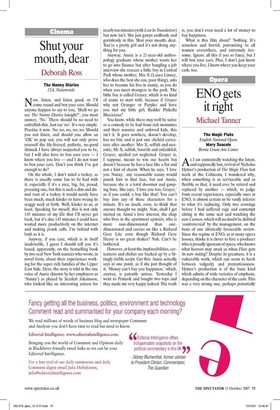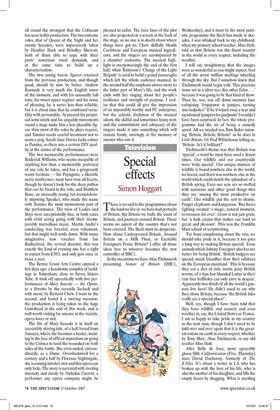ENO gets it right
Michael Tanner The Magic Flute English National Opera Mary Seacole Bernie Grant Arts Centre As I sat contentedly watching the latest, and supposedly last, revival of Nicholas Hytner's production of The Magic Flute last week at the Coliseum, I wondered why, when something is as serviceable and as flexible as that, it need ever be retired and replaced by another — which, to judge from recent experiences, especially ones at ENO, is almost certain to be vastly inferior to what it's replacing. Only two evenings before I had suffered rage and contempt sitting in the same seat and watching the new Carmen, which will no doubt be dubbed 'controversial' by the management, on the basis of one idiotically favourable review. Since the regime at ENO, as at many opera houses, thinks it is clever to hire a producer who is proudly ignorant of opera, who knows what horrors may await us when Flute gets its new outing? Despite its greatness, it is a vulnerable work, which can seem to lurch between vulgarity and pretentiousness. Hytner's production is of the basic kind which admits of wide varieties of emphasis, depending on the character of the casts. This was a very strong one, perhaps potentially all round the strongest that the Coliseum has seen in this production. The two extreme roles, that of Queen of the Night and her enemy Sarastro, were impressively taken by Heather Buck and Brindley Sherratt, both of them able to cope with their parts' notorious vocal demands, and at the same time to build up a characterisation.
The two young heroic figures returned from the previous production, and though good, should by now be better. Andrew Kennedy is very much the English tenor of the moment, and with his unusually full tone, his sweet upper register and his sense of phrasing, he is never less than reliable; but it is about time that he combined versatility with personality. At present his perpetual semi-smirk and his ungainly movements round a stage make him a less plausible figure than most of the roles he plays require, and Tamino needs careful treatment not to seem a prig. Sarah-Jane Davies lacks colour as Pamina, so there was a certain DIY quality at the centre of the performance.
The two memorable performances were Roderick Williams, who seems incapable of anything less than a memorable portrayal of any role he takes, and has a gorgeously warm baritone — his Papageno, a likeable nervy northerner, must have won all hearts, though he doesn't look for the deep pathos that can be found in the role; and Matthew Rose, an unusually young but tremendously imposing Speaker, who made the scene with Tamino the most momentous part of the performance. The trios of Ladies and Boys were exceptionally fine, in both cases with vivid acting going with their incomparably marvellous music. Martin Andre's conducting was forceful, even vehement, but that might well settle down. With many imaginative new touches from Ian Rutherford, the revival director, this was exactly the kind of evening one has a right to expect from ENO, and only gets once or twice a year.
The Bernie Grant Arts Centre opened a few days ago: a handsome complex of buildings in Tottenham, close to Seven Sisters Tube. It took off operatically with two performances of Many Seacole — the Opera, to a libretto by the versatile SuAndi and with music by Richard Chew. I went to the second, and found it a moving occasion: the production is being taken to the Sage Gateshead at the end of this week, and is well worth visiting for anyone in the vicinity, opera-lover or not.
The life of Mary Seacole is in itself an irresistibly stirring tale, of a half-breed from Jamaica, where she becomes a healer, insisting in the face of official opposition on going to the Crimea to tend the wounded on both sides of the battle. She even ended, extraordinarily, as a Dame. Overshadowed for a century and a half by Florence Nightingale, she is coming into her own and this opera can only help. The story is narrated with riveting intensity and clarity by Nicholas Garrett, a performer any opera company might be pleased to enlist. The bare lines of the plot are also projected on a screen at the back of the stage, so no one is in doubt about where things have got to. Chew skilfully blends Caribbean and European musical ingredients, and the singers are accompanied by a chamber orchestra. The musical highlight is overpoweringly the end of the first half, when Tennyson's 'Charge of the Light Brigade' is used to build a grand passacaglia which left the whole audience stunned. In the second half the emphasis moves more to the latter part of Mary's life, and the work ends with her singing about her people's resilience and strength of purpose. I realise that this could all give the impression of an impossibly worthy and PC enterprise; but the eclectic freshness of the musical idiom, the skilful and sometimes funny text, and the commitment and adequacy of the singers made it into something which will remain firmly, movingly in the memory of anyone who saw it.




































































 Previous page
Previous page